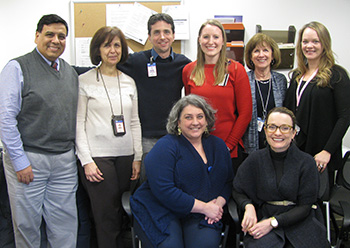
The Aerodigestive program includes, back row (l-r): Americo Esquibies, MD; Alia Bazzy-Asaad, MD; Arik Alper, MD, pediatric gastroenterologist; Laura Czernik, speech-language pathologist; Kathleen French, RD, clinical dietitian; and Aimee Seiderer, speech-language pathologist. Front row: Ava Reyna-Balsamo, RN, nurse coordinator (left); and Susannah Hills, MD, pediatric otolaryngologist. Missing from photo: pediatric surgeons Michael Caty, MD, and Robert Cowles, MD.
Several years ago, bad weather and a grateful parent inspired Alia Bazzy- Asaad, MD, to take action on an idea to help children who were having trouble eating.
During her years of practice, the pediatric pulmonologist had seen a number of patients whose breathing problems made eating difficult. She knew other pediatric specialists also saw children with airway, breathing and swallowing disorders.
One snowy day, Dr. Bazzy-Asaad was treating a patient in the pediatric clinic and wanted to refer her to a gastroenterologist and ear, nose and throat specialist.
"Because of the weather, a number of appointments had been canceled, so the other specialists were able to see the patient in clinic that day," she recalled. "The mother was so appreciative, it confirmed my belief that we should be providing this kind of multi-specialty care in a more formalized way."
Dr. Bazzy-Asaad began planning with pediatric pulmonologist Jonathan Puchalski, MD, and pediatric surgeon Michael Caty, MD, and in 2013, Yale New Haven Children's Hospital's Aerodigestive and Feeding Disorder Program officially opened.
The program diagnoses and treats patients up to age 18 with disorders in the aerodigestive tract (throat, lungs, esophagus and stomach). The disorders range from common to rare and include chronic cough, gastrointestinal reflux disease, tumors or other growths in the airway and complex thoracic issues. Patients with difficulty eating who don't have these conditions are cared for by the feeding program.
The program is staffed by pediatric specialists in pulmonary medicine, interventional pulmonology, gastroenterology, surgery and otolaryngology and staff specializing in nutrition and speech, language and occupational therapy.
"What differentiates our program is the addition of a pediatric surgeon," Dr. Bazzy-Asaad said. "We are able to treat many patients with medication and/or therapy, but for patients who might require surgery, Dr. Caty is integral to the evaluation process and determining what, if any, surgical intervention is required."
For parents, just pinpointing what's wrong can be a relief. "Many parents are desperate, because it's so difficult to see your child unable to eat," said Americo Esquibies, MD, pediatric pulmonologist. "Some of the children have been hospitalized multiple times and have had multiple visits to the ED."
After the evaluation, physicians and staff meet to discuss each patient and develop a treatment plan.
"The plan is comprehensive, and tailored to each patient," Dr. Esquibies said. "The strength of this program is that we cover all aspects of the patient's disease."
For information about the Aerodigestive and Feeding Disorder Program call 203-785-2480.
